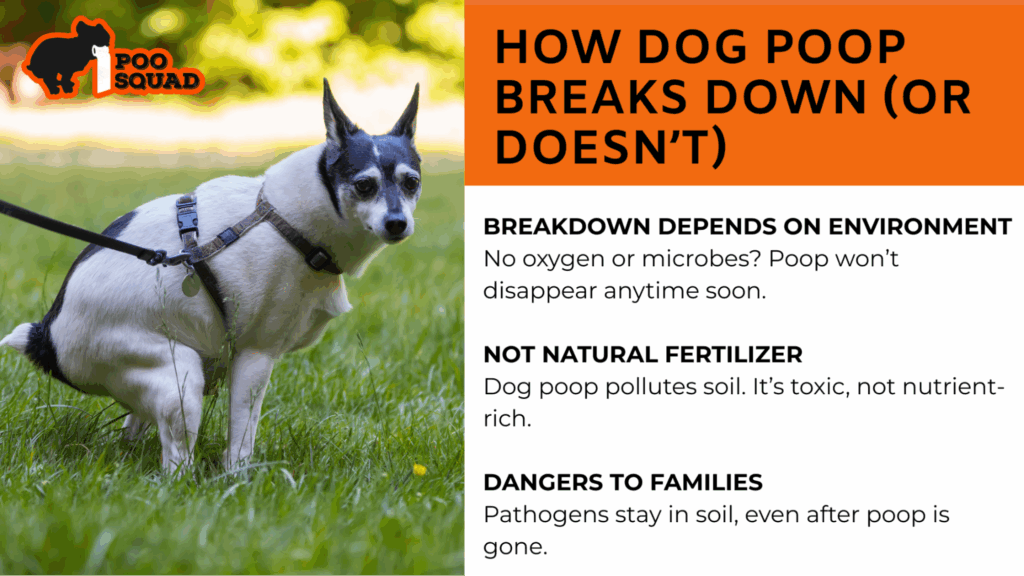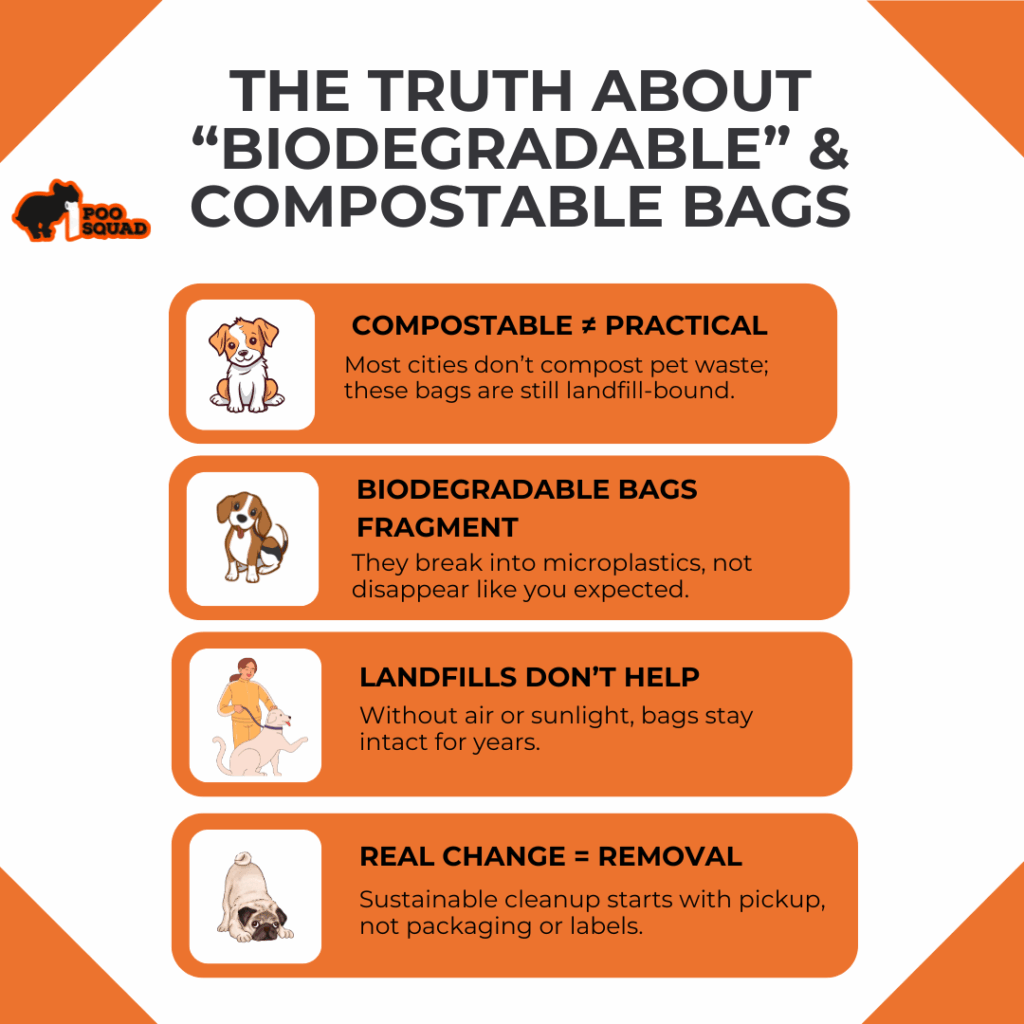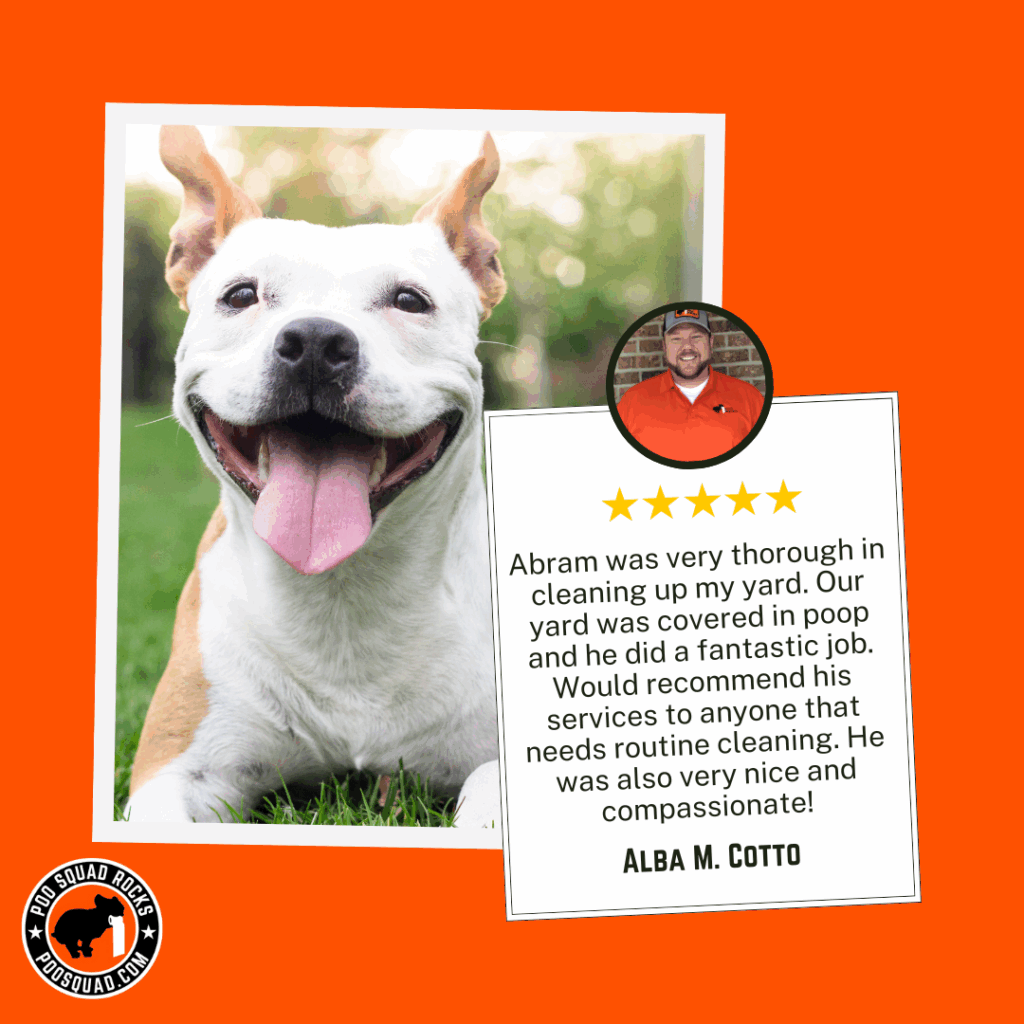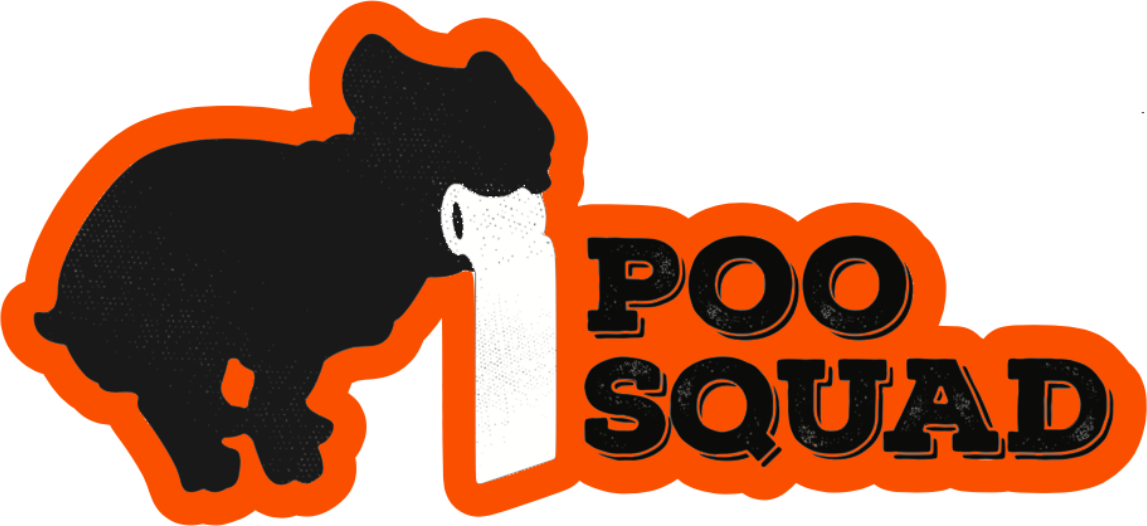Dog poop is technically biodegradable, but not in a safe or eco-friendly way. Left on the ground, it leaches bacteria like E. coli and parasites into the soil, damages grass, and pollutes waterways through runoff. Most “biodegradable” poop bags don’t break down in landfills due to low-oxygen conditions, and backyard composting rarely reaches the temperatures needed to kill harmful pathogens.
To manage dog waste responsibly:
- Always scoop poop promptly to prevent soil and water contamination
- Avoid mowing or burying waste, which spreads bacteria
- Do not compost dog poop in regular garden compost
- Use professional removal services with sanitization to prevent lingering pathogens
- Understand that “green” bags offer no benefit unless composted properly
This guide separates biodegradability myths from facts and outlines safe, sustainable disposal methods that protect your yard, your family, and the environment.
What Does “Biodegradable” Really Mean for Dog Poop?

Biodegradable doesn’t mean what most people think it does. In the case of dog poop, it rarely means safe, fast, or eco-friendly. Whether it breaks down and how much damage it does in the process depend entirely on where it ends up and what’s done with it.
The Science of Biodegradability
When something is biodegradable, it means microbes can break it down over time. But for dog poop, “over time” can mean weeks or even months if left in your yard. And even as it decomposes, it leaks bacteria like E. coli, roundworms, and 23 million coliforms per gram into the soil. That’s not fertilizer. It’s toxic waste.
Most of what’s labeled as biodegradable needs specific conditions:
- oxygen,
- moisture,
- and active microbial life.
Your backyard doesn’t always check those boxes, and your trash bin doesn’t. Most “biodegradable” materials that end up in landfills stay intact for years because landfills are low-oxygen environments designed to seal off waste, not help it break down.
Misconceptions Pet Owners Have
A lot of well-meaning dog owners assume poop will naturally break down. Some leave it in the yard thinking it’ll “compost itself.” Others bag it and toss it in the trash, believing they’ve done their eco-duty. But both choices come with hidden consequences:
- Leaving poop in the yard can damage your lawn and create a bacterial hazard.
- It contaminates the soil, pollutes water runoff, and turns play areas into health risks.
- “Green” poop bags, when tossed in regular trash, often end up in oxygen-starved landfills where they don’t break down for years.
We’ve even had customers admit they used to mow over it, thinking that chopping it up made it safer. In reality, that spreads bacteria and makes things worse.
If this sounds familiar, you’re not alone. That’s exactly why we created a pet-friendly yard deodorizing and sanitation service that not only removes the waste but also protects your outdoor space.
How Dog Poop Breaks Down (or Doesn’t)
Dog poop doesn’t vanish like some kind of natural fertilizer. Instead, it lingers, sometimes for months, while leaching harmful bacteria into your soil and creating the perfect breeding ground for pests and parasites.

Whether it breaks down at all depends heavily on the environment it’s left in, and in most cases, that environment works against you.
Environmental Impact of Leaving Dog Waste Uncollected
Uncollected dog waste is not only gross, it’s a public health risk. Rain doesn’t wash it away safely. Instead, it pushes bacteria and nitrogen-rich residue into storm drains, local streams, and eventually into water supplies. That’s a recipe for toxic algae blooms and contaminated groundwater.
On your lawn, the effects show up fast. Ammonia in the waste kills grass, while pathogens stay active in the soil long after the poop is gone. Families with kids or barefoot dogs end up walking right through those microbial leftovers without even realizing it.
This is why we built our commercial dog waste removal service with strict sanitation protocols, because whether it’s a private backyard or a shared community lawn, the consequences of uncollected waste go far beyond “it smells bad.”
Winter vs. Summer Breakdown
What happens if I leave poop all winter?
Nothing good. In cold months, waste freezes and accumulates. It won’t break down; it sticks around, creating a nasty surprise come spring thaw.
In summer, heat speeds up the stench and bacterial spread, not decomposition. That’s why many of our most overwhelmed new customers call during seasonal transitions; they’ve been waiting for it to go away, and instead, it’s multiplied.
Composting Dog Poop: Feasible or Dangerous?
The idea of composting dog poop sounds eco-friendly, but it’s not as simple, or as safe, as tossing it in your garden bin. If done improperly, composting pet waste can create more harm than good.
Can You Compost Dog Poop at Home?
Technically, yes. Safely?
Only if you know exactly what you’re doing. Composting dog poop requires sustained high heat to kill off pathogens like Salmonella, Giardia, and roundworm. Most home compost setups can’t achieve that. Even then, the finished compost should never be used on food gardens.
We’ve had customers ask if they can mix it into their backyard compost with yard clippings. USDA guidelines clearly say no, unless you want to risk turning your vegetable patch into a bacterial breeding ground.
Some eco-conscious folks try dedicated pet waste compost bins for use on ornamental plants. While this can work with effort and strict process control, the average backyard setup doesn’t cut it.
That’s why many responsible pet owners turn to services like ours that ensure dog poop is removed safely, without turning your lawn into a science experiment.
The DIY Poop Digester Option
One creative option we’ve seen is the homemade dog waste digester, a mini septic system buried in the yard. You dig a hole, drop in an enzyme pod, and let the waste break down underground. Sounds clever, but there are caveats.
Placement matters a lot. Too close to water lines or root systems, and you’re asking for contamination. It also requires regular upkeep and is not great in areas with heavy clay soil or high water tables.
Some folks also wonder about flushing dog poop. While plumbing systems can technically handle it, local wastewater systems might not. Plus, no one wants to clean out that kind of clog.
The Truth About “Biodegradable” & Compostable Bags
Most people assume that tossing poop into a biodegradable or compostable bag means they’ve done their part. But unless those bags are handled under very specific conditions, they end up doing the exact opposite of what’s intended. Spoiler: most of them land in the same trash can as everything else.

Compostable vs. Biodegradable, What’s the Difference?
Compostable bags are designed to break down in commercial composting facilities—places that maintain high heat, humidity, and oxygen levels. Very few cities accept pet waste in those programs. So, unless you’re composting it yourself (and safely), that compostable bag is just expensive trash.
Biodegradable bags are even trickier. Most are made with additives that help them fragment when exposed to air and sunlight.
- Once buried in landfills or tied up in garbage, they don’t get those conditions.
- Instead, they break into microplastics, which linger in the environment far longer than you’d think.
That green label may feel good in your hand, but if it ends up in your regular garbage, you’ve paid extra for nothing. That’s why many of our clients prefer consistent pickup with residential poop removal, rather than relying on bag labels that don’t hold up.
Why Bags Don’t Solve the Problem
If you’re still thinking about switching bag brands as a solution, consider this:
- Over 95% of dog owners throw used bags into standard trash cans.
- No matter how biodegradable or plant-based they are, they’re still going to landfills.
We’ve even heard concerns like:
- Are these bags a scam? → In many cases, yes, they’re marketed to make you feel better while solving nothing.
- Do these eco-bags even work in wet climates? → Often not. They can dissolve prematurely or tear when wet, which defeats their purpose.
True sustainability starts with what happens to the poop itself, not the plastic it’s wrapped in.
Smart, Sanitary, and Sustainable Solutions
If the goal is to protect your yard, your family, and the planet, the most effective solution is not a fancy bag; it’s a system that makes sure dog waste is removed consistently, hygienically, and without cutting corners. That’s where real sustainability lives: in the process, not the packaging.
What Responsible Pet Waste Management Looks Like
Responsible waste handling starts with one simple habit: pick it up. Every time. Leaving poop behind, even in your backyard, is not eco-friendly; it’s environmental neglect. Especially in communities with shared green spaces, uncollected waste turns into a health hazard quickly.
Proper removal means more than scooping. It means using sanitized tools between yards, sealing waste securely, and never relying on your customer’s water hose or trash bin to finish the job.
That’s why we built our commercial dog waste removal program around strict sanitation practices that protect both people and pets.
Why Professional Services Make a Real Difference

We’ve seen it all, from bags left dangling on fences to poop mounded in corners for weeks. And we get it. People are busy. Between work, family, and everything else life throws at you, dog waste drops to the bottom of the list. That’s why reliable, professional help makes such a big difference.
Our team wears bright orange uniforms, so you always know who’s in your yard. We send out automated reminders and text you 10 minutes before we arrive. When we’re done, we leave your yard clean, safe, and ready for your dog, not covered in hidden bacteria or second-guesses.
This kind of consistency doesn’t protect your grass. It keeps your family safe, your weekends stress-free, and your home environment enjoyable.
Emotional and Practical Realities
Picking up dog poop is not only a sanitation issue, it’s an emotional one. We’ve seen firsthand how much guilt, stress, and even family conflict this simple task can create. The waste itself is unpleasant, but what it represents, neglected responsibility, broken routines, overwhelmed days, is what piles up.
Why Picking Up Poop About the Environment
For some of our customers, the first visit is emotional. We’ve had people break down in tears, not because of the poop, but because of the weight it symbolized. One woman stood in her yard after a deep clean and said, “You have no idea how long I’ve felt embarrassed about this.”
We hear this often from people with:
- mobility issues,
- chronic illness,
- or demanding schedules, especially parents juggling it all.
We’ve even been told that hiring us “saved our marriage.” When one partner shoulders the entire burden, or when poop becomes another battle in the family routine, it wears people down fast.
And it’s not only emotional. It’s practical. Clients often ask if they should be:
- composting,
- flushing,
- or burying their dog’s waste to be more eco-friendly.
But the reality is, most of those methods are risky, time-consuming, and not worth the stress. That’s why having a reliable residential poop removal service on your side removes not only the mess, but the mental load too.
Who Should NOT Compost or Skip Pickup?
There are certain situations where trying to go DIY can backfire big time:
- If you live in an apartment or don’t have access to private outdoor space, composting dog waste isn’t an option.
- If your kids play in the yard, leaving waste to “break down on its own” risks spreading bacteria.
- Trying to save money by skipping weeks between pickups often results in:
- lawn damage,
- lingering odors,
- and parasites embedding in the soil.
If you’ve got pets, kids, guests, or even pride in your outdoor space, skipping scoops isn’t worth the cost.
So, Is Dog Poop Biodegradable?
Sure, it technically breaks down. But that’s not the same as safe, clean, or environmentally sound. When left to “biodegrade” on its own, dog poop leaches harmful bacteria, kills grass, pollutes water, and creates a mess you can’t ignore for long.
If you’ve made it this far, you already know that poop doesn’t vanish; it lingers, festers, and frustrates. Whether it’s sitting in your backyard, hiding in your HOA’s common area, or bagged and tossed into your trash, it’s not doing the planet any favors unless it’s removed properly.
Our team doesn’t only scoop, we sanitize, notify, and protect your space like it’s our own. From residential yards to community parks, we handle the dirty work so you can enjoy your life (and your lawn) without compromise.
Dog waste doesn’t have to be a source of guilt or guesswork. With the right help, it becomes one less thing to worry about, and one more way to care for your family, your pets, and your planet.
